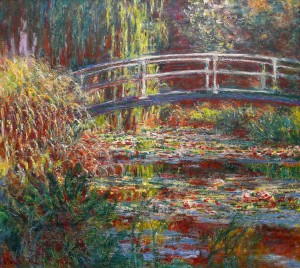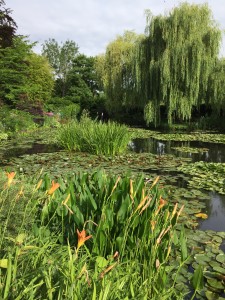
What is Truth?
It is the question Pontius Pilate asked Jesus, and it is the question prompted by our visit this morning to Claude Monet’s home in Giverny, France.
We toured Monet’s home, his flower garden, and his famous water garden. Monet’s paintings of his water garden are famous.
Monet’s impressionism style is noted not for delineating the subject of his painting but for his use of brush strokes to create in the observer’s eye an experience of variations of light. In Monet’s Impressionism, the realism of the scene portrayed in the painting was subordinated to the subjective impression of the observer of the painting.
Impressionism was a movement away from classical realism and toward abstract art. Impressionism was followed by the progressively more abstract Post-Impressionism of Van Gogh, Fauvism of Matisse, and Cubism of Picasso, ultimately ending with the truly abstract art of Jackson Pollock, who would literally sling paint randomly onto the canvas. In the end, the object of the painting was lost and the observer’s subjective experience of the painting became everything.
As Francis Schaeffer has noted, it is no coincidence that at the same time art was moving from an emphasis on the objective to emphasize the subjective, philosophy was as well. By the time Pollock arrived on the scene and began randomly slinging paint on the canvas, Sartre, through his Existentialism, was advocating a random universe where meaning was found only in the subjective experience of the individual.

So, with abstract art people do not ask if it is “good.” Instead, they ask, “What does it say to you?” And with regard to Truth, or should I say, “truth,” people now do not ask, “What is Truth?” Instead they ask, “What is your story?” Art and philosophy are two rivers from with the same source—the human heart.
So, what is Truth?
Jesus said, “I am the Way, the Truth, and the Life; no one comes to the Father but through Me.” (John 14:7). Truth is experienced, but Truth ultimately is objective and has been manifested in a Person.
I’m not an art historian, a philosopher, or a theologian, but that’s how I see it.
Tomorrow, we tour Rouen, the site of Joan of Arc’s execution, or was it her martyrdom? GS

